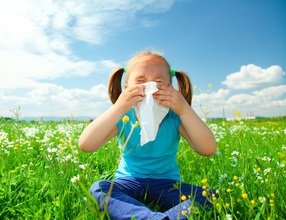Back to Allergy
Global allergy epidemic -- new data on vaccines/probiotics and dairy allergy
International Congress of Immunology

PROBIOTICS FOR NEWBORNS: 20 YEAR STUDY REVEALS LONG TERM ALLERGY PROTECTION
Allergies belong to the most common diseases with steadily increasing incidence. Probiotics are believed to prevent or reduce allergy development. Nevertheless, the mechanism of their beneficial effect is poorly understood.
In research presented at the International Congress of Immunology (11:50 Monday) by Jiri Hrdy, from the Charles University in Prague, Czech Republic, showed that decreased allergy incidence was observed 5, 10, 20 years after initial supplementation of newborns with Colinfant New Born (E. coli O83:K24:H31).
To reveal the mechanism of the action, the researchers looked at the blood of probiotic colonized and noncolonized children of allergic mothers (high risk children) and noncolonized children of healthy mothers.
They also tested the capacity of immune cells derived from cord blood to protect against allergies if associated with probiotic bacteria.
The researchers hypothesized that the beneficial effect of probiotics on newborn immature immune system could be, at least partially, explained by effect it has on immune cells, giving an insight into how babies at risk of allergies (because of a family history) may be protected against developing allergies later in life through exposure to probiotics as a neonate.
NEW LONG LASTING VACCINE AGAINST CAT ALLERGIES
Prof Mark Larche, Canada's Research Chair in Allergy and Immune Tolerance at McMaster University in Ontario will describe a new vaccine for people with cat allergies that last 8 times longer than existing vaccines. He also believes that children are growing up in an environment that is too clean for their immune system to properly learn which substances to attack and which to ignore: parents should let their kids roll around in the dirt to boost their immunity.
DAIRY FARM KIDS' IMMUNITY TO MILK ALLERGIES KEY TO ASTHMA VACCINE
Professor Hamida Hammad, from the VIB life sciences institute in Belgium will discuss how her team used the fact that children exposed to dust on dairy farms are generally protected against developing allergies and asthma to reveal a genetic mutation in 1500 children who lived on farms that did not have immunity against allergies and asthma. The discovery opens the way for a vaccine to prevent asthma, which affects over 330 million people worldwide.
Comment:
Dr. Eisenstein's practice never saw the drastic increase of allergies among his patients. He attributed that to two factors, the increase use of c-section for birth and vaccines. The first introduction of probiotics are passed at birth from mother to baby. That transmission is absent in a c-section. Dr. Eisenstein's birth practice had a c-section rate of under 10% as compared to the 40%+ commonly seen today. Regarding vaccines, Dr. Eisenstein explained when dealing with autoimmune medical issues, look to vaccines which are designed to attack the immune system. The majority of his patients choose to exercise their right to not vaccinate. No vaccines, no c-sections, no allergies.
Allergies belong to the most common diseases with steadily increasing incidence. Probiotics are believed to prevent or reduce allergy development. Nevertheless, the mechanism of their beneficial effect is poorly understood.
In research presented at the International Congress of Immunology (11:50 Monday) by Jiri Hrdy, from the Charles University in Prague, Czech Republic, showed that decreased allergy incidence was observed 5, 10, 20 years after initial supplementation of newborns with Colinfant New Born (E. coli O83:K24:H31).
To reveal the mechanism of the action, the researchers looked at the blood of probiotic colonized and noncolonized children of allergic mothers (high risk children) and noncolonized children of healthy mothers.
They also tested the capacity of immune cells derived from cord blood to protect against allergies if associated with probiotic bacteria.
The researchers hypothesized that the beneficial effect of probiotics on newborn immature immune system could be, at least partially, explained by effect it has on immune cells, giving an insight into how babies at risk of allergies (because of a family history) may be protected against developing allergies later in life through exposure to probiotics as a neonate.
NEW LONG LASTING VACCINE AGAINST CAT ALLERGIES
Prof Mark Larche, Canada's Research Chair in Allergy and Immune Tolerance at McMaster University in Ontario will describe a new vaccine for people with cat allergies that last 8 times longer than existing vaccines. He also believes that children are growing up in an environment that is too clean for their immune system to properly learn which substances to attack and which to ignore: parents should let their kids roll around in the dirt to boost their immunity.
DAIRY FARM KIDS' IMMUNITY TO MILK ALLERGIES KEY TO ASTHMA VACCINE
Professor Hamida Hammad, from the VIB life sciences institute in Belgium will discuss how her team used the fact that children exposed to dust on dairy farms are generally protected against developing allergies and asthma to reveal a genetic mutation in 1500 children who lived on farms that did not have immunity against allergies and asthma. The discovery opens the way for a vaccine to prevent asthma, which affects over 330 million people worldwide.
Comment:
Dr. Eisenstein's practice never saw the drastic increase of allergies among his patients. He attributed that to two factors, the increase use of c-section for birth and vaccines. The first introduction of probiotics are passed at birth from mother to baby. That transmission is absent in a c-section. Dr. Eisenstein's birth practice had a c-section rate of under 10% as compared to the 40%+ commonly seen today. Regarding vaccines, Dr. Eisenstein explained when dealing with autoimmune medical issues, look to vaccines which are designed to attack the immune system. The majority of his patients choose to exercise their right to not vaccinate. No vaccines, no c-sections, no allergies.

